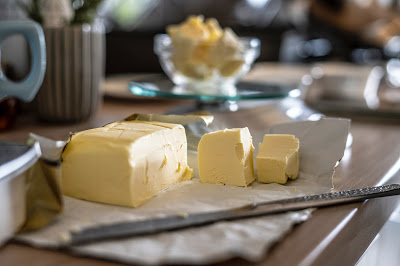"Fats in our diets serve as a major source of energy, that also helps your bodies to absorb the fat-soluble vitamins and minerals needed to maintain and repair cells damaged during everyday wear and tear. It is also needed to generate cell membranes and the sheath surrounding nerves. It is also essential for blood clotting, muscle movement, and inflammation."
| Oils |
Fats and Oils foods are required in the diet in order to classify it as a balanced one, therefore we cannot eliminate them from our diets. Additionally, even when not consumed directly, they are still present in foods from other food groups, etc. Legume, and Foods from Animals. We need fats in our diets because it is a major source of energy that helps your body to absorb fat-soluble vitamins and minerals that help in the maintenance and repair due to everyday wear and tear. It is also needed to generate cell membranes and the sheath surrounding nerves. It is also essential for blood clotting, muscle movement, and inflammation. For long-term health, some fats are better than others. Good fats include monounsaturated and polyunsaturated fats. Bad ones include industrial-made trans fats. Saturated fats fall somewhere in the middle.
Monounsaturated fats are usually liquid at room temperature and are usually found in olive oil, peanut oil, canola oil, avocados, and most nuts, as well as high-oleic safflower and sunflower oils.
Corn oil, sunflower oil, and safflower oil are common examples. Polyunsaturated fats are essential fats. That means they're required for normal body functions but your body can't make them. So, you must get them from food. Polyunsaturated fats are used to build cell membranes and the covering of nerves. They are needed for blood clotting, muscle movement, and inflammation.
Good sources of omega-3 fatty acids include fatty fish such as salmon, mackerel, and sardines, flaxseeds, walnuts, canola oil, and non-hydrogenated soybean oil.
Omega-3 fatty acids may help prevent and even treat heart disease and stroke. In addition to reducing blood pressure, raising HDL, and lowering triglycerides, polyunsaturated fats may help prevent lethal heart rhythms from arising. Foods rich in linoleic acid and other omega-6 fatty acids include vegetable oils such as safflower, soybean, sunflower, walnut, and corn oils.
Here are the foods in this group that we have in the Caribbean and the recommended serving sizes.
We will be discussing macro-nutrients and their benefits to the diet.
Your turn now, feel free to comment. Do you think fats are bad?


0 comments:
Post a Comment